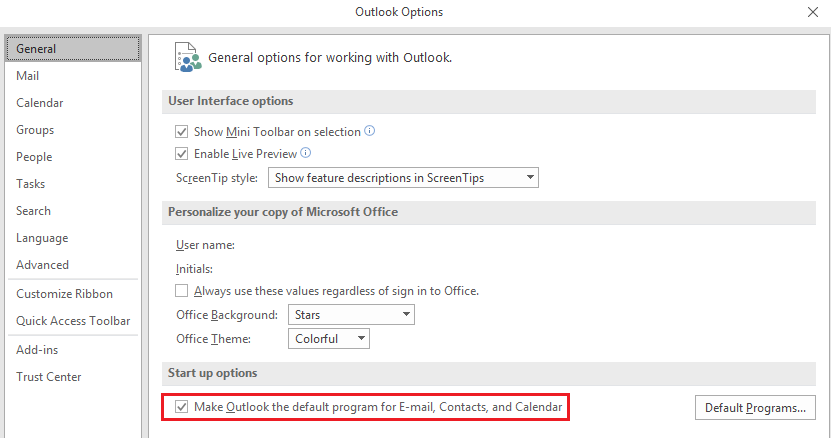Hkeylocalmachine Software Clients Mail Default Program Editor

When you attempt to send a file from Microsoft Excel, Microsoft Word, or Microsoft PowerPoint using email, you receive the following error: Either there is no default mail client or the current mail client cannot fulfill the messaging request. Please run Microsoft Outlook and set it as the default mail client. Diagramma ganta primer skachatj.
Important This topic does not apply for Windows 10. The way that default file associations work changed in Windows 10. For more information, see the section on Changes to how Windows 10 handles default apps in. When a user sets program defaults using Default Programs, the default setting applies only to that user and not to other users who might use the same computer. Default Programs provides a set of APIs (deprecated in Windows 8) that enable independent software vendors (ISVs) to include their programs or applications in the defaults system.

The API set also helps ISVs better manage their status as defaults. This topic is organized as follows: • • • • • • • • • • • • • Introduction to Default Programs and Its Related API Set Default Programs is primarily designed for applications that use standard file types such as.mp3 or.jpg files or standard protocols, such as HTTP or mailto. Applications that use their own proprietary protocols and file associations do not typically use the Default Programs functionality. After you register an application for Default Programs functionality, the following options and functionality are available by using the API set: • Restore all registered defaults for an application.
Deprecated for Windows 8. • Restore a single registered default for an application.
Deprecated for Windows 8. Maket ugolovnogo dela po krazhe menu. • Query for the owner of a specific default in a single call instead of searching the registry. You can query for the default of a file association, protocol, or Start menu canonical verb. • Launch a UI for a specific application where a user can set individual defaults. • Remove all per-user associations. Default Programs also provides a UI that enables you to register an application in order to provide additional information to the user. For example, a digitally signed application can include a URL to the manufacturer's home page.
Use of the associated API set can help an application function correctly under the user account control (UAC) feature introduced in Windows Vista. Under UAC, an administrator appears to the system as a standard user, so that administrator cannot typically write to the HKEY_LOCAL_MACHINE subtree. This restriction is a security feature that prevents a process from acting as an administrator without the administrator's knowledge. Installation of a program by a user is typically performed as an elevated process.
However, attempts by an application to modify default association behaviors at a machine level post-installation will be unsuccessful. Instead, defaults must be registered on a per-user level, which prevents multiple users from overwriting each other's defaults.
The hierarchical registry structure for file and protocol associations gives precedence to per-user defaults over machine-level defaults. Some applications include points in their code that temporarily elevate their rights when they claim defaults registered in HKEY_LOCAL_MACHINE. These applications might experience unexpected results if another application is already registered as the per-user default.
Use of Default Programs prevents this ambiguity and guarantees expected results on a per-user level. Registering an Application for Use with Default Programs This section shows you the registry subkeys and values needed to register an application with Default Programs. It includes a full example.
This section contains the following topics: • • • • Default Programs requires each application to register explicitly the file associations, MIME associations, and protocols for which the application should be listed as a possible default. Note We recommend you call the Set associations for a program by using. Best Practices for Using Default Programs This section provides best practice guidelines for using Default Programs when you register applications. It also offers design suggestions for creating an application that provides users with optimal Default Programs functionality. During Installation In addition to the installation procedures normally practiced under Windows XP, a Windows Vista or later based application must register with the Default Programs feature to take advantage of its functionality. Perform the following sequence of steps during installation.
Steps 1-3 match the steps that were used in Windows XP; step 4 was new in Windows Vista. • Install the necessary binary files.
• Write ProgIDs to HKEY_LOCAL_MACHINE. Note that applications must create application-specific ProgIDs for their associations. • Register the application with Default Programs as previously explained in. After Installation This section discusses how the application prompt should first present its default options to each user. It also discusses how an application can monitor its status as the default for its possible associations and protocols.